No Democracy in an Unequal World

This blog argues that inequality is the primary barrier to both defending the democratic institutions we have in the UK, and to ensuring transition to a more meaningful democracy in practice.
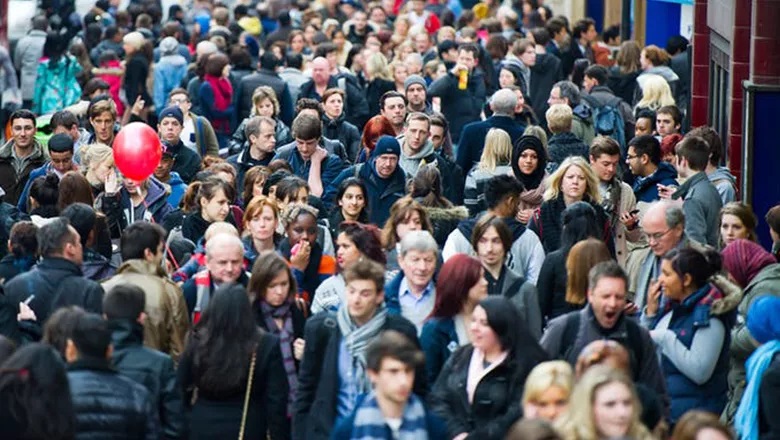
What does democracy mean to you?
It is a point of national pride for many people in the UK that we live in a democracy. At the same time, however, we have never felt less represented in our political systems. 84% of people believe that politicians don’t care what people like them think. Only 6% believe voters have an influence over government, whilst one in two felt the greatest influence on our political systems are political donors and business elites. Across the country, two thirds of people feel their local economies are held back by Westminster.
Meanwhile, we still have two men for every woman MP. Only 7% of MPs are working class. Anti-protest measures that inhibit our civil and political rights have deliberately targeted racialized groups. People with disabilities make up 24% of the population but only 1% of MPs. And politicians across the political spectrum now routinely participate in the abuse of transgender people that has fueled soaring hate crime, making it difficult for trans and LGBTQIA+ people to exist in public, let alone feel safe to engage in politics.
So the question is: do we really have a democracy in practice? If not, how do we fix it?
What does democratic repair look like?
The opening question to this blog seems like a basic one. But since I joined the democracy sector, I’ve come to appreciate the extent to which people have quite different visions of what democracy means, and how we can achieve it in practice.
Some feel most strongly that we need to defend the democratic institutions that we have, which are fundamentally assumed to be a good thing. Their solutions lie in establishing greater accountability through robust parliamentary processes. Others don’t believe that what we have was ever a democracy in the first place. They seek more radical solutions, such as replacing the House of Lords with an alternative more suited to the 21st Century, or moving to national decision-making by the people through Citizens’ Assemblies.
To me, these solutions and many more are vital to address the symptoms of the UK’s democratic deficit and imagine alternative futures. But to make meaningful change to shift power on a structural and systemic level, we need to focus more on the root cause: inequality. And because growing inequality fuels regression of democracy, that need has never been more urgent.
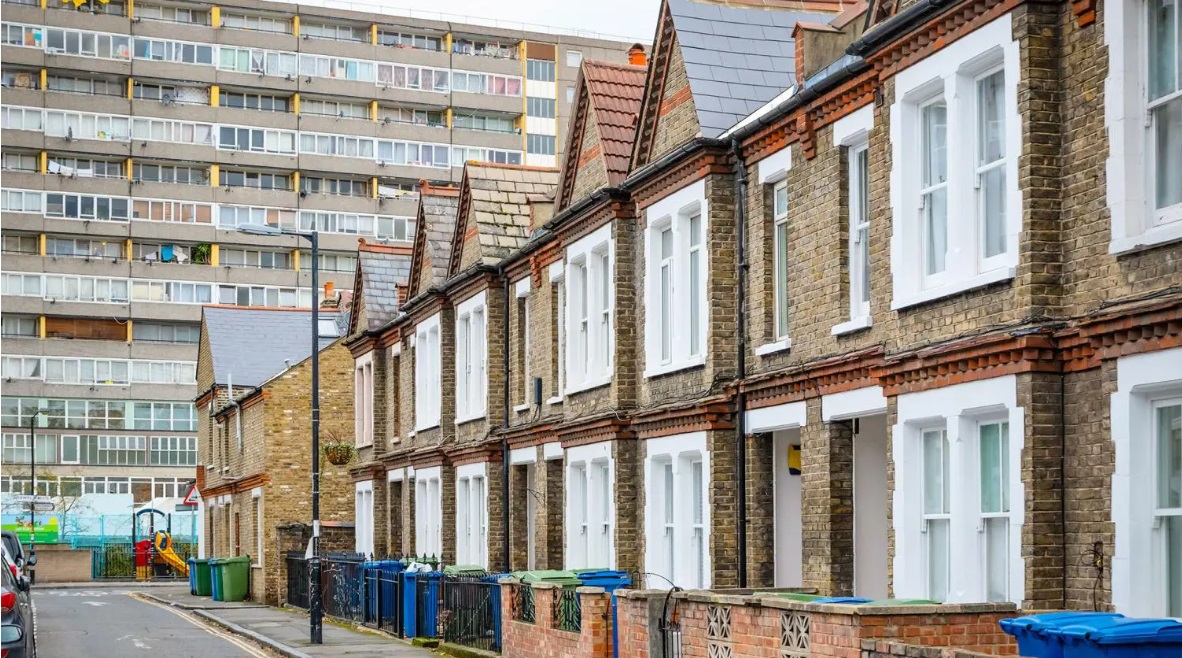
A row of houses on a street in the UK, with a block of flats in the background.
Growing inequality fuels regression of democracy
The high correlation between growing inequality and regression of democratic standards in the UK is not coincidental. Inequality undermines democracy because it creates additional barriers to political participation for people pushed furthest from power. And it undermines our ability as citizens to hold people in power to account.
When policy decisions on key national infrastructure such as healthcare or transport are outsourced to market- oriented institutions, it is harder for the public to challenge their elected representatives when their basic social needs and human rights are not being met.
For people living in poverty, day-to-day survival takes precedence over political participation. The economic conditions that create hardship can be utilized for manipulative purposes. Scarcity narratives that pit those furthest from power against each other splinters communities and prevents collective action.
In this context, it’s easier for ‘elites’ to make policy decisions that are fundamentally undemocratic. The inhibition of civil and political rights can be justified in the name of ‘national security’ or ‘protecting ordinary working people’ when people do not feel safe or protected within an existing system.
Structural inequality is the root cause of our demographic deficit
So why aren’t we talking about it? And by talking about it, I don’t mean through tokenistic gestures to ‘diversity and inclusion’ that operate on a self-refuting neoliberal logic, but centering the role of inequality in the movement for democratic reform.
Too often, democratic issues feel intangible to ordinary people and detached from their everyday experiences. In reality, all the issues people in the UK care about the most: the cost of living crisis, the deterioration of our national health service, the inability of working people to afford their own home, are a consequence of policy decisions not centred in the realities and needs of people in the UK. This is the first in a new blog series ‘No Democracy in an Unequal World’ that aims to unpack what those realities are for those who experience the greatest barriers to political participation.
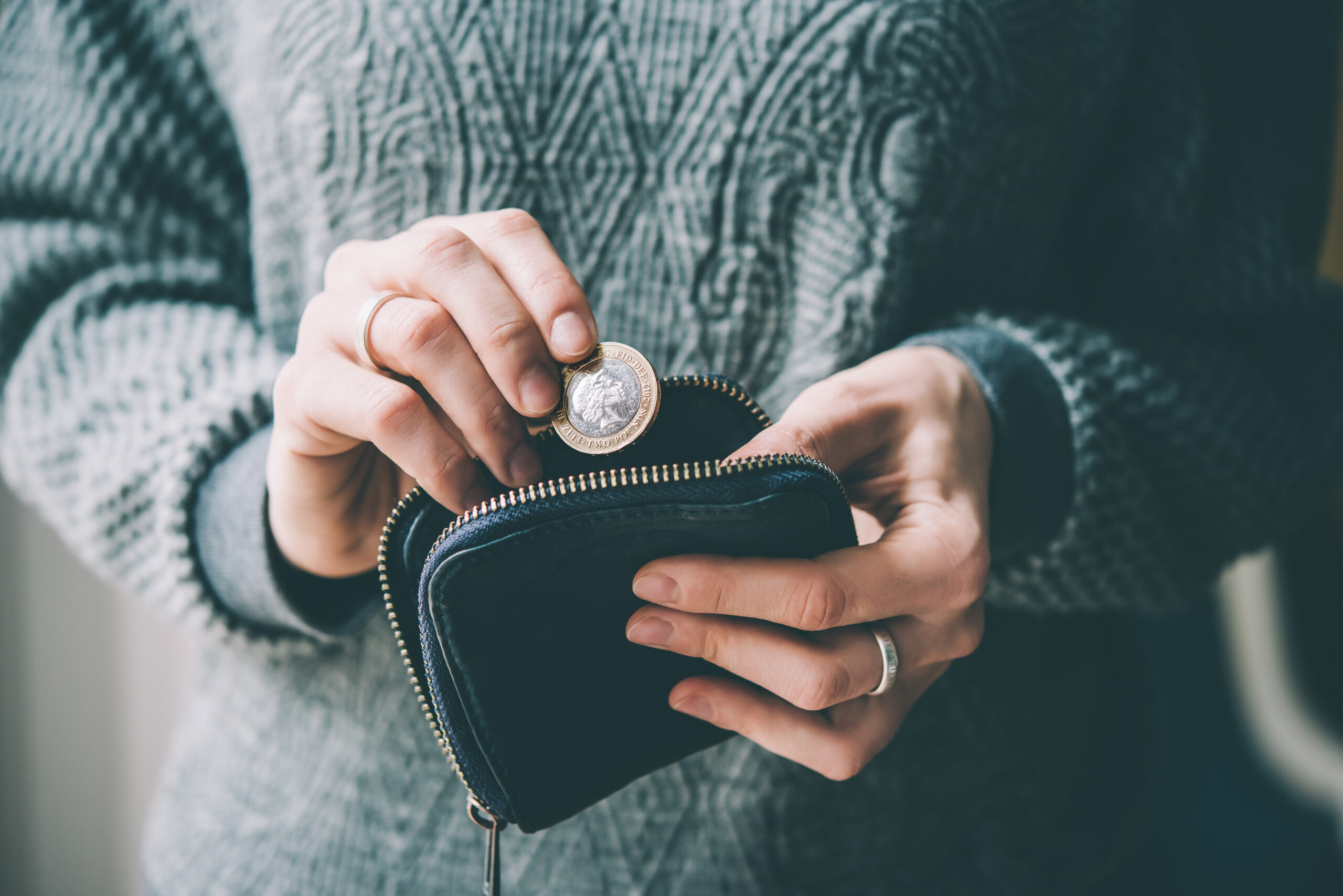
A person places a £2 coin into a purse.
We need to rebuild the foundations of modern democracy from a model of intersectional justice
Because the regression of democracy has a particularly significant impact on people experiencing intersecting forms of inequality.
Contrary to the premise of scarcity narratives, the impacts on people and groups who experience discrimination on the basis of identity cannot be separated from the disenfranchisement caused by the economic disadvantage millions now face in the UK. In all areas, people experiencing intersecting inequalities are more likely to be poor, and less likely to have their needs met, understood and supported by existing systems.
Solidarity requires systemically removing barriers to participation
For example, funding to ensure disabled people do not experience cost-related barriers to becoming political representatives has failed to be re-instated; exacerbating the obstacles disabled people already experience as a result of discrimination. It’s therefore not surprising that there are only 5 MPs who identify as disabled; if parliament were representative of the population, there would be 130.
Meanwhile, you need only look to the parliamentary rhetoric surrounding the establishment of the Police, Crime, Sentencing and Courts Act 2022 and Public Order Act 2023 to recognize the degree to which anti-Blackness and racism towards GRT communities is endemic to a political outlook that frames some people as ‘ordinary hard-working people’ and others as ‘dangerous criminals’. No surprise again, then, that Black people are more likely to feel disenfranchised from political systems and, among other racialized people and groups, are less likely to vote.
Voter ID requirements have demonstrably had a discriminatory impact across oppressed communities, but have had a particular impact on LGBTQIA+ people. Research has shown that 96% of trans and non-binary people surveyed experienced at least one barrier to accessing ID; in particular, 88% of trans respondents and 81% of nonbinary respondents said that concerns about their privacy and safety – such as the risk of being ‘outed’ or asked intrusive questions – making voting a situation that could potentially not be safe. Chatham House has found that ‘state-sanctioned attacks on sexual and gender minorities can be a bellwether of democratic backsliding’: demonstrating that transphobic rhetoric in parliament does not just violate human rights but is fundamentally undemocratic.
No democracy without human rights and equality
These findings are further exacerbated by the fact that the regression of democratic standards has been coupled with the strategic erosion of fundamental human rights protections. To reclaim our democracy, then, requires reclaiming our human rights as a framework to keep power accountable to equality in practice.
Drawing from anti-subordination methodologies can enable us to work more meaningfully in solidarity with people whose rights are more likely to be violated. This outlook requires shifting the traditional frameworks from which democratic institutions were built that can serve to reinforce structural oppression, to instead working in a rights-based approach to democracy.
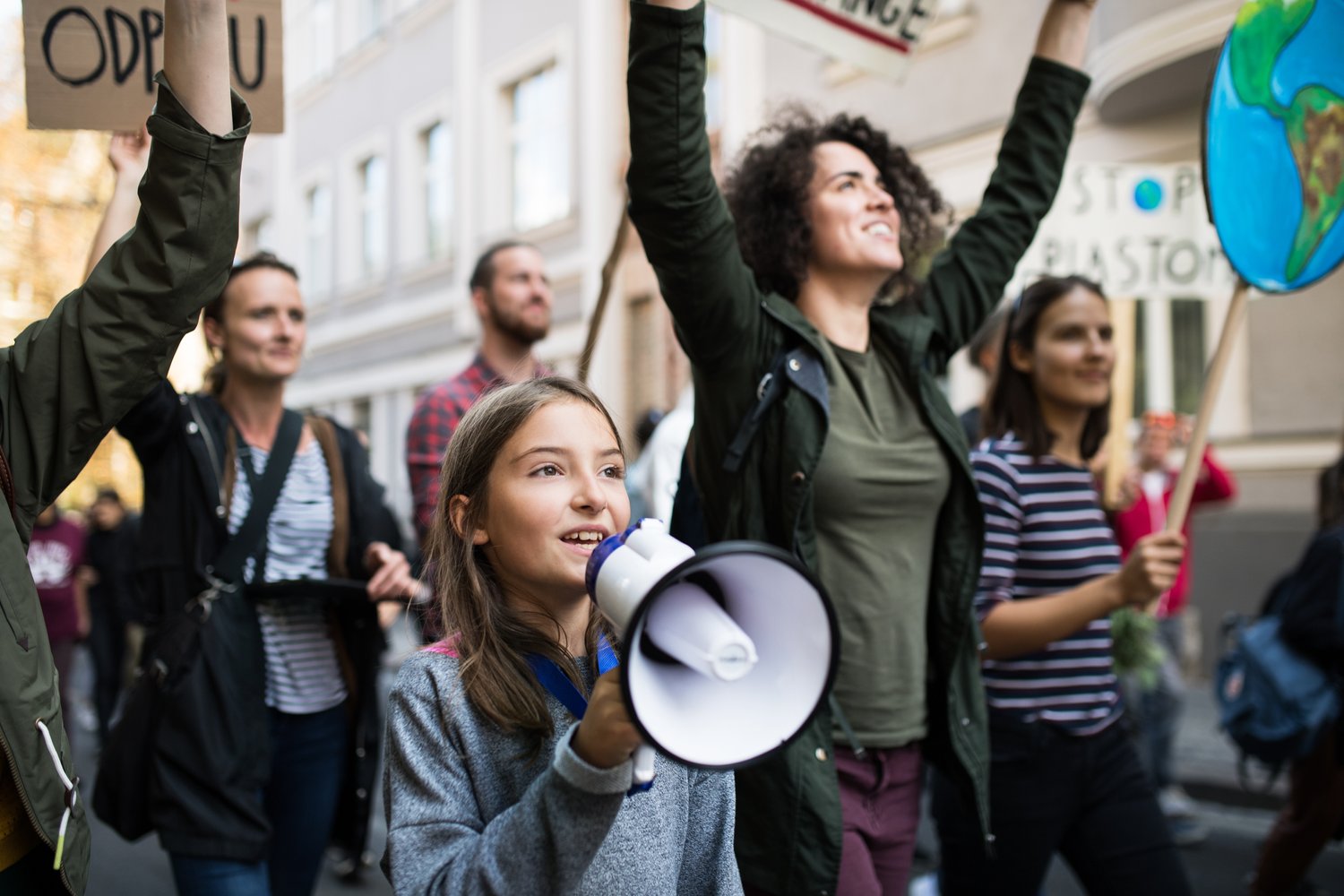
People taking part in a protest. A child holds a megaphone.
What could this look like?
To return to the opening question: for me, democracy in its ideal form would be a system that would enable the realization of the human rights and participation of all people in the community and society in which they live.
It’s a framework that would exist to fulfil the obligations of governments to its citizens according to our rights enshrined in the Universal Declaration of Human Rights: including access to healthcare, food, employment and, crucially, participation in democratic society. It would enable citizens to hold people in power accountable when this doesn’t happen through mechanisms such as Citizens’ Juries.
It would protect our shared interests. A system that is representative and inclusive of the people affected by policy decisions. That takes their views into account in the formation of policy, centering the realities and needs of those historically furthest from power. Only then can we ensure the equality of opportunity required to achieve freedom and justice for all.
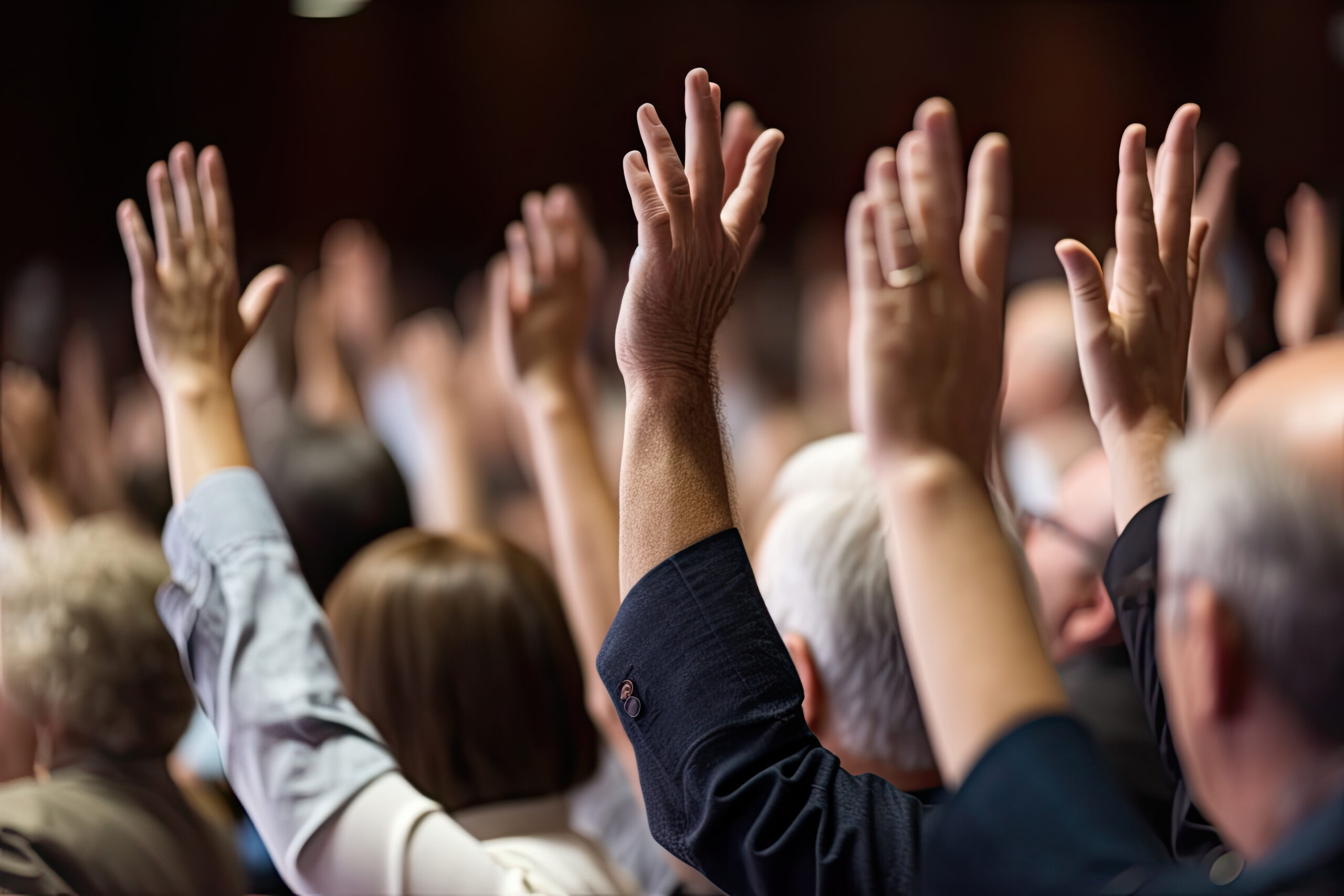
People raise their hands to vote on a decision.
Sharing people’s lived realities
This blog series will share the human stories that speak to the realities of inequality on access to democracy.
In different ways, we are all affected by inequalities and privileges, and have experienced systemic injustices. But it is important to not flatten or conflate the ways in which differing forms of inequality are experienced and intersect with each other in the realities of people’s lives.
By working together to understand each other’s realities better, we can build a vision for the future of democracy and the UK that represents the values ordinary people hold in fairness, freedom and mutual respect. So let’s listen to each other to find out how to close the gap between where we are now and the country we can imagine and rebuild together: to be one founded in justice, equality and community.